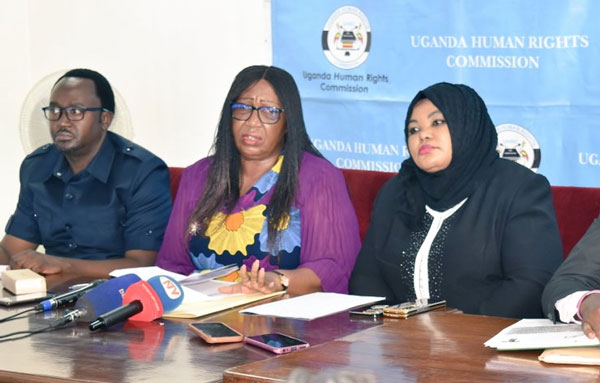
Kampala, Uganda | THE INDEPENDENT | The government should not be compelled to compensate families of the latest suspected Allied Democratic Forces-ADF rebel attack on Lhubiriha Secondary School in Kasese district, according to the Uganda Human Rights Commission-UHRC. At least 42 people including 39 students, two residents, and one security guard were killed during the brutal attack last Friday.
Another eight students sustained critical injuries and were rushed to Bwera Hospital. Following the attack, the government offered Shillings 5 million to the families of each victim. However, criticism emerged especially from leaders from Kasese, saying the money was too little for the bereaved families. They suggested at least not less than 20 million Shillings.
While responding to questions at a media briefing at the UHRC offices on Tuesday, the Commission Chairperson Mariam Wangadya said that government shouldn’t be compelled to compensate the families of people killed by the attackers arguing that no amount of money can compensate for a life lost.
Wangadya said that the affected families are at liberty to probably sue the government for negligence if they so wish. She however hastened to add that government expressed a good gesture with the five million Shillings extended to families to facilitate funeral arrangements of their loved ones.
She condemned the attack describing it as an unjustifiable, barbaric, despicable, and criminal act of violence and terrorism. She said schools must be a safe and secure environment for learners, teachers, and support personnel but unfortunately, this environment has been violated but terrorists.
She appealed to the International community to stand with Uganda and her forces in the fight against terrorism and also urged the school attackers to free the six students said to have been taken captive.
Wangadya who was addressing journalists ahead of the International Day in Support of Victims of Torture, which is marked every 26th of June also issued a situation analysis of the acts of torture in Uganda. The analysis indicates that although there are efforts to stop torture, the act has persisted due to several reasons.
It should be noted that in 2020, UHRC registered 308 (49 percent) cases of torture out of the total 627 human rights violation cases reported. In 2022, torture cases stood at 267 out of 691 cases, accounting for 37 percent of the human rights violation reports that the commission received. In the same vein, the Coalition Against Torture in Uganda (ACTV), a civil society organization that deals with treatment, rehabilitation, and provision of legal aid to torture victims registered 788 complaints of torture in 2022, 1,151 in 2021, 960 in 2020 and 1070 in 2019.
Wagadya attributes the persistence to factors such as the failure to effectively implement the Prevention and Prohibition of Torture regulations of 2017. She hence called for effective documentation and investigation of torture cases. She further reiterated her call to the government to enact the Witness Protection law which she says shall enable witnesses of torture to give witness during the investigation.
Samuel Herbert Nsubuga, the Chairperson of the Coalition Against Torture voiced the need for continuous sensitization of the public against violence and torture.
Uganda shall join the world to mark the International Day in Support of Victims of Torture on Monday 26th June 2023 under the theme “Stop Torture, Rebuild Lives of Survivors for Sustainable Development”. The celebrations shall be preceded by media campaigns against torture, community dialogues in Gulu and Barazas in Sebei region, an Anti-torture football gala in the Central region, and climax with a National Public Dialogue on the 26th June at the Gold Course Hotel.
****
URN
 The Independent Uganda: You get the Truth we Pay the Price
The Independent Uganda: You get the Truth we Pay the Price



